Brexit's Impact on Taxi Services in Plymouth: A Literature Review
Added on 2023-06-12
36 Pages13950 Words77 Views
5/1/2018
How will Brexit
affect Taxi
services in
Bianca Suciu
PLYMOUTH UNIVERSITY
How will Brexit
affect Taxi
services in
Bianca Suciu
PLYMOUTH UNIVERSITY
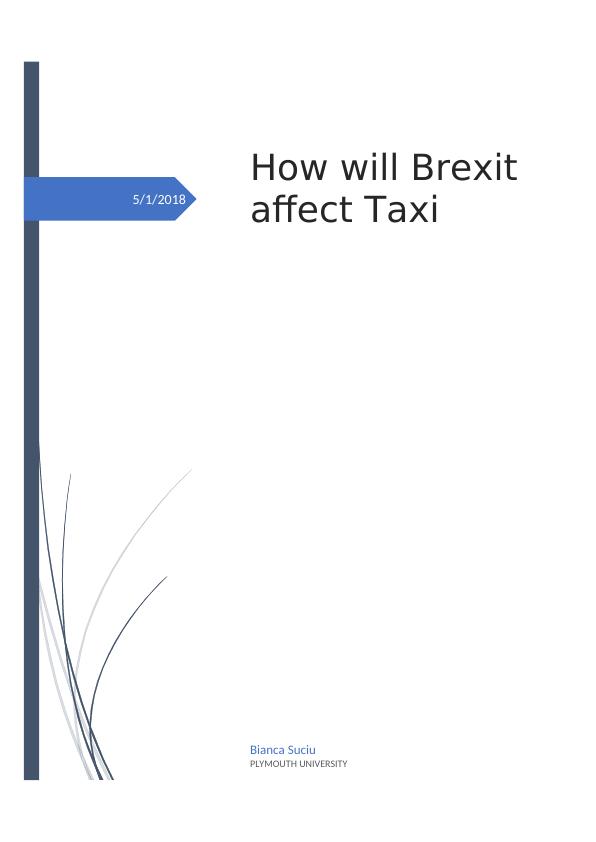
Contents page
1) INTRODUCTION
2) TYPES OF BREXIT POSSIBLE
3) LITERATURE REVIEW
4) THE UNITED KINGDOM’S HISTORY IN THE EUROPEAN UNION
5) UK and EU HISTORY
6) NEGATIVE IMPACTS OF BREXIT
7) POSITIVE IMPACTS OF BREXIT
8) THE TAXI MARKET
9) THE PROCESS REQUIRED TO BECOME A TAXI DRIVER IN PLYMOUTH
10) TAXI FIRST HISTORY
11) UBER DRIVERS
12) METHODOLOGY
13) ANALYSIS OF SURVEY
14) DISCUSSION
15) CONCLUSION
16) CRITICAL EVALUATION
1) INTRODUCTION
2) TYPES OF BREXIT POSSIBLE
3) LITERATURE REVIEW
4) THE UNITED KINGDOM’S HISTORY IN THE EUROPEAN UNION
5) UK and EU HISTORY
6) NEGATIVE IMPACTS OF BREXIT
7) POSITIVE IMPACTS OF BREXIT
8) THE TAXI MARKET
9) THE PROCESS REQUIRED TO BECOME A TAXI DRIVER IN PLYMOUTH
10) TAXI FIRST HISTORY
11) UBER DRIVERS
12) METHODOLOGY
13) ANALYSIS OF SURVEY
14) DISCUSSION
15) CONCLUSION
16) CRITICAL EVALUATION
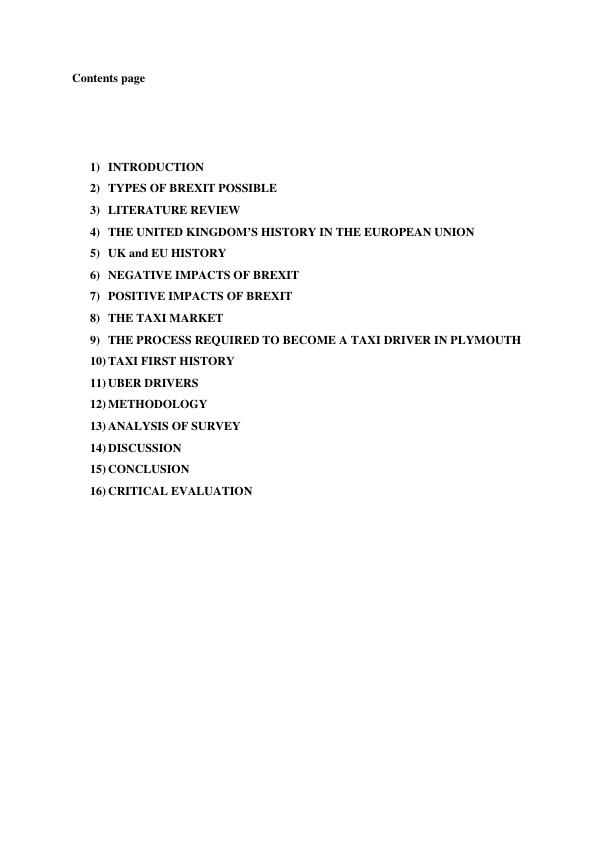
INTRODUCTION
The European Union is an International organisation of 28 countries. There is a common
economic, social and security governance in these countries with minimal trade barriers in
them to improve the trade surplus of these countries. Though originally focused on the
Western part of Europe, it went through a massive expansion in the resent times to also
include Central European and East European Countries (Union and Pettinger, 2018). The EU
was founded by the Maastricht Treaty in 1st November , 1993. The main objective of this
treaty was to strive towards greater improvements in the integration of these countries
economically and politically. To do this they introduced the Euro, a single currency which
was to be used by most of the member nations (Encyclopedia Britannica, 2018). It is thought
to be further advancing he goal of unified Economic and political unity along with providing
common citizenship rights and also making sure to work together in areas of political
greyness specially relating to terrorism, immigration , asylum and other such judicial affairs.
The 2 countries comprises of Austria, Belgium, Bulgaria, Croatia, Cyprus, the Czech
Republic, Denmark, Estonia, Finland, France, Germany, Greece, Hungary, Ireland, Italy, Lat
via, Lithuania, Luxembourg, Malta, Poland, Portugal, Romania, Slovakia, Slovenia, Spain,
Sweden, the Netherlands, Poland, Portugal, Romania, Slovakia, Slovenia, Spain, Sweden,
and the United Kingdom. The United Kingdom obviously has decided to move out of the EU
in the historic vote on 23 June 2016 in which about 51% of the voting population voted that it
wants out. The actual departure is set to happen on Friday, the 29th of March 2019 at 11 Pm
Greenwich Mean Time. The United kingdom and the EU have thus far decided that it will
provisionally dwell on the three issues of the divorce and that would be how much does the
UK owe the EU, what would happen t the city’s of United Kingdom who are living in other
part of the EU and the EU citizens who are now settles in the UK, and the third issues would
The European Union is an International organisation of 28 countries. There is a common
economic, social and security governance in these countries with minimal trade barriers in
them to improve the trade surplus of these countries. Though originally focused on the
Western part of Europe, it went through a massive expansion in the resent times to also
include Central European and East European Countries (Union and Pettinger, 2018). The EU
was founded by the Maastricht Treaty in 1st November , 1993. The main objective of this
treaty was to strive towards greater improvements in the integration of these countries
economically and politically. To do this they introduced the Euro, a single currency which
was to be used by most of the member nations (Encyclopedia Britannica, 2018). It is thought
to be further advancing he goal of unified Economic and political unity along with providing
common citizenship rights and also making sure to work together in areas of political
greyness specially relating to terrorism, immigration , asylum and other such judicial affairs.
The 2 countries comprises of Austria, Belgium, Bulgaria, Croatia, Cyprus, the Czech
Republic, Denmark, Estonia, Finland, France, Germany, Greece, Hungary, Ireland, Italy, Lat
via, Lithuania, Luxembourg, Malta, Poland, Portugal, Romania, Slovakia, Slovenia, Spain,
Sweden, the Netherlands, Poland, Portugal, Romania, Slovakia, Slovenia, Spain, Sweden,
and the United Kingdom. The United Kingdom obviously has decided to move out of the EU
in the historic vote on 23 June 2016 in which about 51% of the voting population voted that it
wants out. The actual departure is set to happen on Friday, the 29th of March 2019 at 11 Pm
Greenwich Mean Time. The United kingdom and the EU have thus far decided that it will
provisionally dwell on the three issues of the divorce and that would be how much does the
UK owe the EU, what would happen t the city’s of United Kingdom who are living in other
part of the EU and the EU citizens who are now settles in the UK, and the third issues would
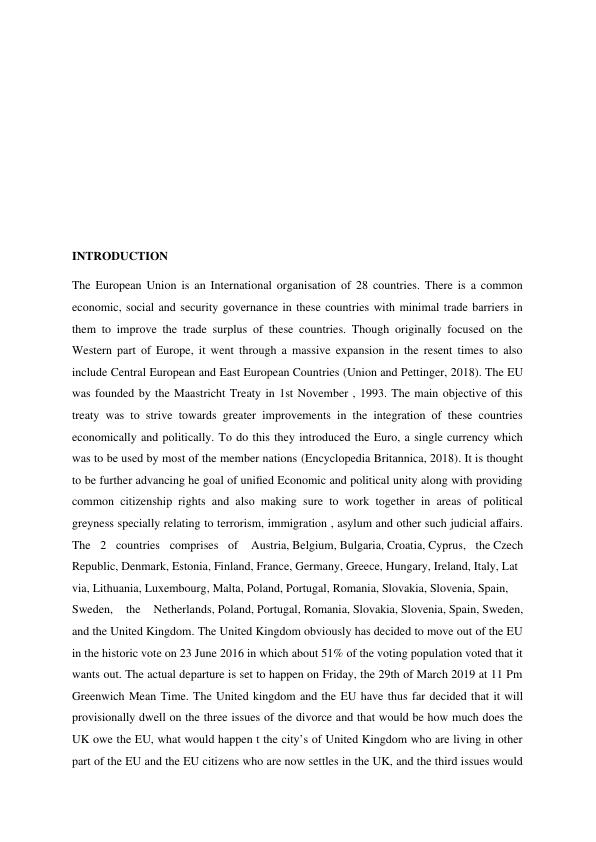
be what would happen to the Northern Irish Wall. Positive talk has been taking place on how
to smooth relations with the EU post the Brexit and there was an agreement reached on a 21
month transition period to see all the changes through smoothly. BREXIT which is the
portmanteau of Britain and Exit is something that has actually impacted people from every
walk of life in the United Kingdom (Hunt and Wheeler, 2018). Very famously the London
stock market crashed and it had a huge impact on the value of the Pound Sterling in the days
following the results of the referendum. It had political impacts with David Cameron
resigning and giving over reigns to a new Prime Minister to sail the country through the
turbulent waters. British nationals have thus not only had to have an impact economically and
politically, but socially also looks at the prospect of a less open country, culturally and trade-
wise. The Taxi industry would have been one to be hit the most. A lot of the taxi drivers are
immigrants and with the current political situation would most probably not be feeling safe
enough to make this country their home. Thus there could a dearth of good taxi drivers.
Again, there might be less of an influx of people due to stricter regulations and therefore less
business. Again, there are influences to be had on this in terms of the competition with the
app based aggregators such as UBER. We shall look into this well in the next few sections.
There would be no way for us to
TYPES OF BREXIT POSSIBLE
The biggest advantage of the European Union is that it provides access to the Euopean Single
(Geoghegan, 2017) . What this means is that there are zero tariffs on exports to and imports
from the rest of the European Union. Hence there are no quotas or taxes on trade. Also the
European Union being a custom union means that the cost of trading is much lower than what
it would have been otherwise, specially the administrative cost is pretty much as low as can
be as with the EU one cannot put in VAT, rules of origin and physical checks. Another very
important advantage is the free movement of resources, be they technological, intellectual
physical or human (Chang, 2018). Goods and services being able to move freely provides a
very big boost to the trade and economy of the region and helps in the efficient allocation of
resources in all sectors or as close to it as possible. We shall further look into some possible
scenarios depending on how the final agreement with the EU stands.
Hard and soft exits are terms generally coined by the media to distinguish the two kinds of
exit that might be happening from the European union.
to smooth relations with the EU post the Brexit and there was an agreement reached on a 21
month transition period to see all the changes through smoothly. BREXIT which is the
portmanteau of Britain and Exit is something that has actually impacted people from every
walk of life in the United Kingdom (Hunt and Wheeler, 2018). Very famously the London
stock market crashed and it had a huge impact on the value of the Pound Sterling in the days
following the results of the referendum. It had political impacts with David Cameron
resigning and giving over reigns to a new Prime Minister to sail the country through the
turbulent waters. British nationals have thus not only had to have an impact economically and
politically, but socially also looks at the prospect of a less open country, culturally and trade-
wise. The Taxi industry would have been one to be hit the most. A lot of the taxi drivers are
immigrants and with the current political situation would most probably not be feeling safe
enough to make this country their home. Thus there could a dearth of good taxi drivers.
Again, there might be less of an influx of people due to stricter regulations and therefore less
business. Again, there are influences to be had on this in terms of the competition with the
app based aggregators such as UBER. We shall look into this well in the next few sections.
There would be no way for us to
TYPES OF BREXIT POSSIBLE
The biggest advantage of the European Union is that it provides access to the Euopean Single
(Geoghegan, 2017) . What this means is that there are zero tariffs on exports to and imports
from the rest of the European Union. Hence there are no quotas or taxes on trade. Also the
European Union being a custom union means that the cost of trading is much lower than what
it would have been otherwise, specially the administrative cost is pretty much as low as can
be as with the EU one cannot put in VAT, rules of origin and physical checks. Another very
important advantage is the free movement of resources, be they technological, intellectual
physical or human (Chang, 2018). Goods and services being able to move freely provides a
very big boost to the trade and economy of the region and helps in the efficient allocation of
resources in all sectors or as close to it as possible. We shall further look into some possible
scenarios depending on how the final agreement with the EU stands.
Hard and soft exits are terms generally coined by the media to distinguish the two kinds of
exit that might be happening from the European union.
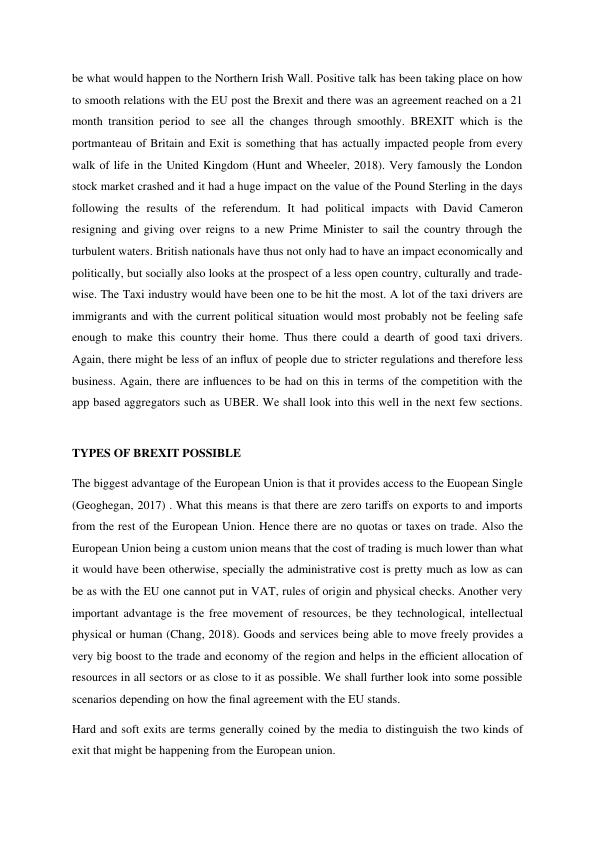
There is no strict definition of the term but generally is used to mean the closeness of the UK
with the EU post Brexit. His would mean hat are the advantages that UK can retain of the
European Union after leaving as of March 2019 (Reuters, 2018).
The hard exit is the extreme case and he one usually favoured by those who were ardent in
favour of the Brexit. This kind of arrangement will in all probability see the United Kingdom
give up rights to the Single European Market and also the full access fo the customs union
along with the EU. This arrangement would be able to promise the country full control over
its borders as well as its immigration policies, making new trade deals and applying laws
within the country. This would mean that the UK return to the trading rules and regulations
set up by the World Trade Organization for all its trading activities. One of the pros to this
approach is that it can foster economic improvement in Britain by making it such that there is
global trading nation (Cleary, 2012). Leaders of business in Eu nations such as Germany have
similar views in that it is better to have a hard exit and the Britain pave its own way than to
be in the middle such that its stance is a political statement for every time or would have to
go through severe discussion from time to time. Here they also would not have to contribute
to the EU budget in any way making way for more cost cutting by them (Scutt, 2018).
The cons of this would be that it could see the price of Britsh good and services subject to
tariffs, adding around ten percent to the goods of exported things for example, cars. To add to
this, certain sectors such as agriculture would also be losing protections against cheap imports
from abroad putting the agricultural industry into an upheaval which would again lead to the
rise in the prices of agricultural good and hence in the general standard of living (Arnorsson
and Zoega, 2018).
Leaving the union would also mean that the checks that are done in the bureaucratic region
for goods passing through the ports and airports would also increase. Thus there is heftier
administrative costs to bear for trade. It would also find it difficult to have much impact in
forging trade deals with major nations as it has already been announced that US and Australia
would be prorating into making significant trade deals with European Region.
Soft exit on the other hand means that means that the relationship of the UK to the EU would
be as close as possible to the existing relationship that is now there (BBC News, 2018). To a
lot of the retainers this seems like an uncomfortable compromise. This would neckssarily
mean that The United Kingdom would not be having a seat in the European Council and will
with the EU post Brexit. His would mean hat are the advantages that UK can retain of the
European Union after leaving as of March 2019 (Reuters, 2018).
The hard exit is the extreme case and he one usually favoured by those who were ardent in
favour of the Brexit. This kind of arrangement will in all probability see the United Kingdom
give up rights to the Single European Market and also the full access fo the customs union
along with the EU. This arrangement would be able to promise the country full control over
its borders as well as its immigration policies, making new trade deals and applying laws
within the country. This would mean that the UK return to the trading rules and regulations
set up by the World Trade Organization for all its trading activities. One of the pros to this
approach is that it can foster economic improvement in Britain by making it such that there is
global trading nation (Cleary, 2012). Leaders of business in Eu nations such as Germany have
similar views in that it is better to have a hard exit and the Britain pave its own way than to
be in the middle such that its stance is a political statement for every time or would have to
go through severe discussion from time to time. Here they also would not have to contribute
to the EU budget in any way making way for more cost cutting by them (Scutt, 2018).
The cons of this would be that it could see the price of Britsh good and services subject to
tariffs, adding around ten percent to the goods of exported things for example, cars. To add to
this, certain sectors such as agriculture would also be losing protections against cheap imports
from abroad putting the agricultural industry into an upheaval which would again lead to the
rise in the prices of agricultural good and hence in the general standard of living (Arnorsson
and Zoega, 2018).
Leaving the union would also mean that the checks that are done in the bureaucratic region
for goods passing through the ports and airports would also increase. Thus there is heftier
administrative costs to bear for trade. It would also find it difficult to have much impact in
forging trade deals with major nations as it has already been announced that US and Australia
would be prorating into making significant trade deals with European Region.
Soft exit on the other hand means that means that the relationship of the UK to the EU would
be as close as possible to the existing relationship that is now there (BBC News, 2018). To a
lot of the retainers this seems like an uncomfortable compromise. This would neckssarily
mean that The United Kingdom would not be having a seat in the European Council and will
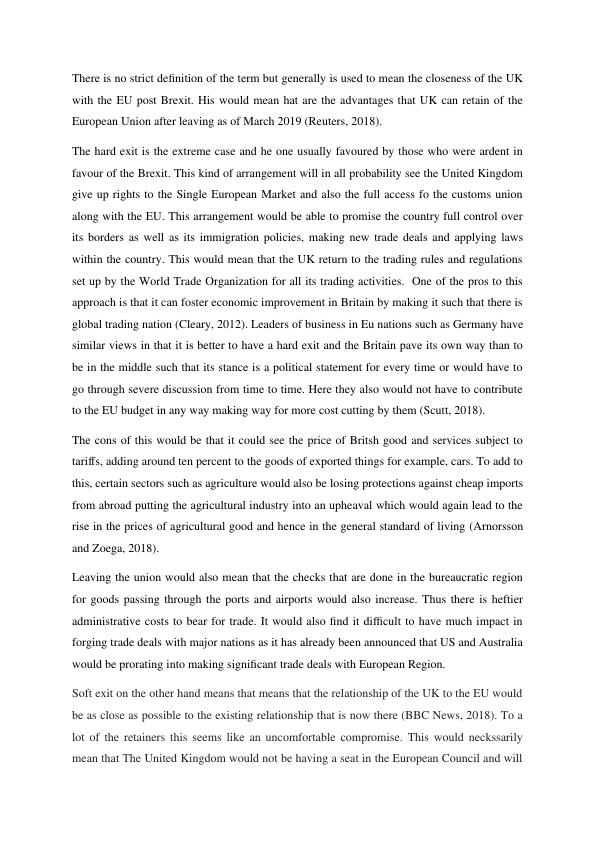
obviously no longer be a member of the European Union. It would lose all the high officials
related to these posts. However the very clear advantage would be that it would have
unrestricted access to the European Single Market which is with whom the bulk of its trade
happens. Good and services would continue to be traded on primarily a tariff free basis and
there would be no quotas or such imposed on British goods. Financial firms could also retain
their rights to sell services and operate the branches within the EU. Britain would continue to
be a part of the custom union and thus goods would not need to be subjected to border checks
which would save plenty in administrative costs. This sort of deals have happened before
with nations such as Norway, Iceland and Liechtenstein, which are not members of the EU
but have access to the single market by being part of the European Economic Area (Sims,
2018). To have access to this EEA, these countries must make contributions to the European
budget and also accept that there would be freedom of movement of goods, services, capital
and people. They are subject to EU law through the Luxembourg-based EFTA Court. So
Britan has a very real example on what would be the kind of things they would have to follow
in these situations.
It is likely that a "soft Brexit" deal would insist on Britain observing the "four freedoms",
meaning continued free access for European nationals to work and settle in the UK.
Another kind of agreement which was previously done by Switzerland was a bilateral
agreement in which there would have been access to the single market for specific sectors as
well as there were secured tariffs. However it was outside the customs union and had to make
financial contribution towards the EU. Under this, it still allowed free movement of people
under the Schengen agreement.
At this point it is very much understood how much these trade laws could govern the stability
of the country as a whole (Midgley, 2018). The economic conditions of a country are
governed by trade and hence to get a better deal after weighing the pros and cons could
seriously help with making sure the there are no disruptions as to when the country switched
from a EU member country to a non member. Also decisions made in this respect would have
related to these posts. However the very clear advantage would be that it would have
unrestricted access to the European Single Market which is with whom the bulk of its trade
happens. Good and services would continue to be traded on primarily a tariff free basis and
there would be no quotas or such imposed on British goods. Financial firms could also retain
their rights to sell services and operate the branches within the EU. Britain would continue to
be a part of the custom union and thus goods would not need to be subjected to border checks
which would save plenty in administrative costs. This sort of deals have happened before
with nations such as Norway, Iceland and Liechtenstein, which are not members of the EU
but have access to the single market by being part of the European Economic Area (Sims,
2018). To have access to this EEA, these countries must make contributions to the European
budget and also accept that there would be freedom of movement of goods, services, capital
and people. They are subject to EU law through the Luxembourg-based EFTA Court. So
Britan has a very real example on what would be the kind of things they would have to follow
in these situations.
It is likely that a "soft Brexit" deal would insist on Britain observing the "four freedoms",
meaning continued free access for European nationals to work and settle in the UK.
Another kind of agreement which was previously done by Switzerland was a bilateral
agreement in which there would have been access to the single market for specific sectors as
well as there were secured tariffs. However it was outside the customs union and had to make
financial contribution towards the EU. Under this, it still allowed free movement of people
under the Schengen agreement.
At this point it is very much understood how much these trade laws could govern the stability
of the country as a whole (Midgley, 2018). The economic conditions of a country are
governed by trade and hence to get a better deal after weighing the pros and cons could
seriously help with making sure the there are no disruptions as to when the country switched
from a EU member country to a non member. Also decisions made in this respect would have
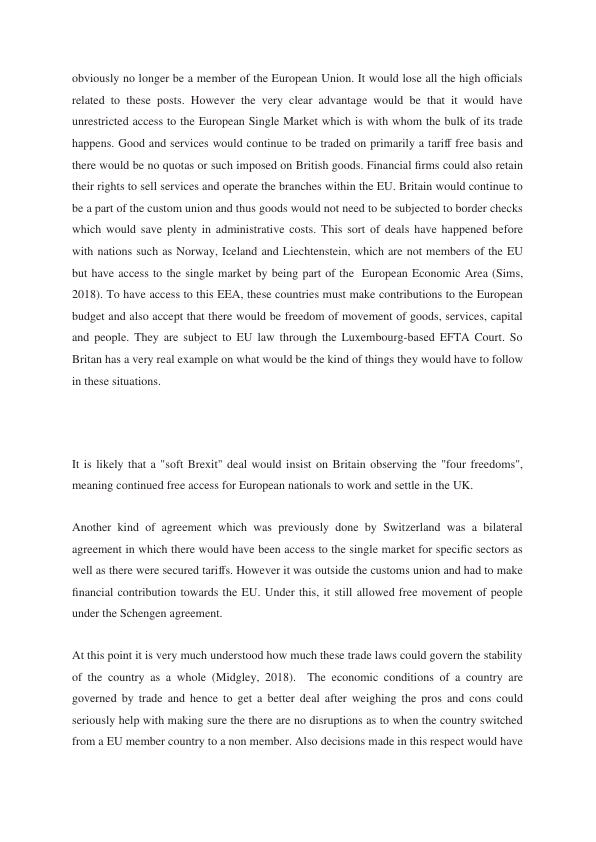
far reaching consequences in all sectors. As in the modern world everything is interconnected
and with interconnectivity raises the chances of all the dominoes tumbling down when one
thing goes wrong. As seen with the Global Crisis of 2007, shocks do not take time to travel
fro one sector to another and hence see of the most hard hitting sectors if this foes wrong
might be the sectors which originally on the surface would have had low impact from the
exiting of the United Kingdom from the EU.
LITERATURE REVIEW
This literature review will examine a few articles, with different point of views and the one
that fit the purpose of this project will be chosen as an example for further examination. It is
very likely that Brexit will affect the whole UK and also all the sectors, such as public
services, food and drink industry, agriculture, economics and many others to some degree.
The aim of the literature review is based on taxi services across the UK and how those
services will be mostly affected in Plymouth.
Actual cities are oversaturated, on one hand most of the population is concentrated in large
cities (in 2030 it is projected that more than 80% (UNFPA 2007) of the population will live
in urban areas), on the other hand mobility needs of the modern population are growing
continuously. While urban demand for trips is growing constantly, supply (capacity of city
streets) is limited, and must be optimised, not increased (most of the times not possible inside
the city). Well-planned, efficiently operated, and cost-effective transportation system
management (TSM) strategies can improve mobility of existing systems for transportation
users, especially in urban environments, where a good optimization of the infrastructure is
needed (considering the high cost of building new facilities and the continuously increasing
demand resulting from economic and population growth). Last year’s tendencies are shifting
person trips from private vehicles to public vehicles, increasing the Public Transport share
importantly. The most used Public Transports are the “Mass Transports” such as metro, tram
or bus. This kind of transport usually has a centralised management which uses ITS
technologies developed in the last decade for an optimal operation of the service.
Unfortunately, inflexibility, long total travel time and insufficient service coverage of Mass
Transport systems cause a lower usage of them in most metropolitan areas. Oppositely, the
and with interconnectivity raises the chances of all the dominoes tumbling down when one
thing goes wrong. As seen with the Global Crisis of 2007, shocks do not take time to travel
fro one sector to another and hence see of the most hard hitting sectors if this foes wrong
might be the sectors which originally on the surface would have had low impact from the
exiting of the United Kingdom from the EU.
LITERATURE REVIEW
This literature review will examine a few articles, with different point of views and the one
that fit the purpose of this project will be chosen as an example for further examination. It is
very likely that Brexit will affect the whole UK and also all the sectors, such as public
services, food and drink industry, agriculture, economics and many others to some degree.
The aim of the literature review is based on taxi services across the UK and how those
services will be mostly affected in Plymouth.
Actual cities are oversaturated, on one hand most of the population is concentrated in large
cities (in 2030 it is projected that more than 80% (UNFPA 2007) of the population will live
in urban areas), on the other hand mobility needs of the modern population are growing
continuously. While urban demand for trips is growing constantly, supply (capacity of city
streets) is limited, and must be optimised, not increased (most of the times not possible inside
the city). Well-planned, efficiently operated, and cost-effective transportation system
management (TSM) strategies can improve mobility of existing systems for transportation
users, especially in urban environments, where a good optimization of the infrastructure is
needed (considering the high cost of building new facilities and the continuously increasing
demand resulting from economic and population growth). Last year’s tendencies are shifting
person trips from private vehicles to public vehicles, increasing the Public Transport share
importantly. The most used Public Transports are the “Mass Transports” such as metro, tram
or bus. This kind of transport usually has a centralised management which uses ITS
technologies developed in the last decade for an optimal operation of the service.
Unfortunately, inflexibility, long total travel time and insufficient service coverage of Mass
Transport systems cause a lower usage of them in most metropolitan areas. Oppositely, the
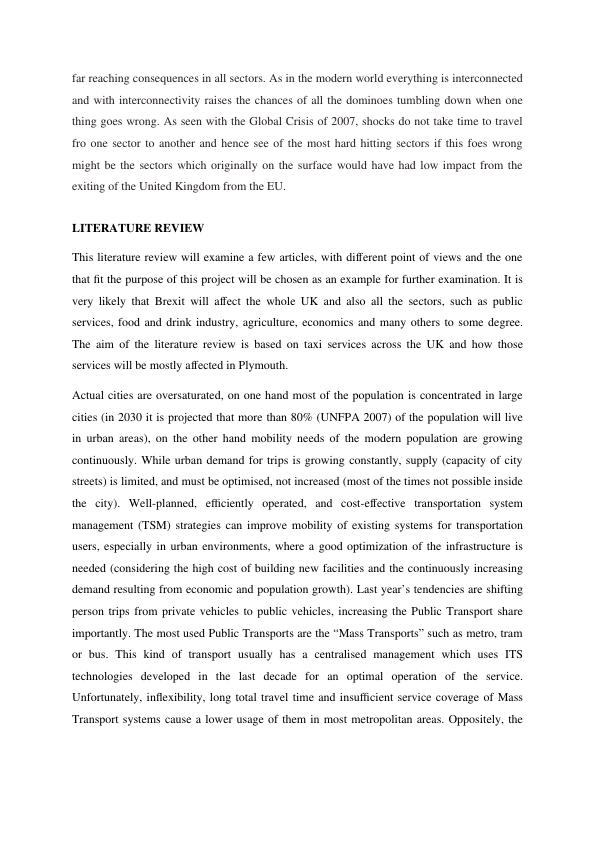
taxi-cab sector is a more convenient mode due to its speediness, door-to-door attribute,
privacy, comfort, long-time operation and lack of parking fees.
The great inconvenience is the lack of central management; each taxi is operated by an
independent driver, taking his own decisions continuously, with a weak intent of control by
the policy issues of each city such as license control or distributing the working days of the
taxi vehicles (normally the control is imposed on vehicles, not on drivers, generating double
shift and increasing the use of taxis). An important percentage of the cars (e. g. 60% in Hong
Kong (Yang et al. 2000) in the daily flow are taxis, most of them empty taxies. This situation
is creating two problems, an internal problem to the taxi drivers (higher empty kilometers
means lower benefits) and an external problem to the citizens (congestion and pollution). The
first problem is being aggravated with the actual economic crisis, which is breaking the
market equilibrium: demand is decreasing due to the lower incomes of the population and
offer is increasing due to the increasing number of taxi drivers (not taxi licenses). Market
equilibrium cannot be achieved in this concrete market because of the regulations (price is
not established freely) and cannot go to the next equilibrium point due to the price policies
imposed in each city. This is a vicious cycle, where empty hours are increasing, and taxi
drivers need to work more time in order to have the same income, which means lower income
per hour (Daniel (2006). In this situation, taxi drivers prefer to stop at taxi stands and wait for
a client, without expending fuel in empty trips and consequently saturating the taxi stands. If
taxi stops network is not well designed, this situation will create a decrease in the Level of
Service of the passengers, decreasing the demand and congesting the streets near the taxi
stops. The taxi sector has been traditionally a regulated market in terms of fares and entry
control. The objective of this regulation is to correct the defects of the taxi sector, such as
externalities (congestion and contamination), low level of service offered and anticompetitive
behaviour of the market. A fundamental distinction in types of taxi regulations is between
quantity regulation, quality regulation and market conduct regulation. Quality regulation
embraces the standard of vehicles, driver and operator; this type of regulation is more a safety
regulation than a competitiveness one. Market conduct regulation includes rules regarding
pick up of passengers, or affiliation to a radio network. Quantity regulations include price
regulation and entry restriction. From now and on, the term regulation will refer to quantity
regulation. Restrictions on entry to the taxi market have been applied by many cities around
the world, but actually many cities are deregulating their markets. The most common
privacy, comfort, long-time operation and lack of parking fees.
The great inconvenience is the lack of central management; each taxi is operated by an
independent driver, taking his own decisions continuously, with a weak intent of control by
the policy issues of each city such as license control or distributing the working days of the
taxi vehicles (normally the control is imposed on vehicles, not on drivers, generating double
shift and increasing the use of taxis). An important percentage of the cars (e. g. 60% in Hong
Kong (Yang et al. 2000) in the daily flow are taxis, most of them empty taxies. This situation
is creating two problems, an internal problem to the taxi drivers (higher empty kilometers
means lower benefits) and an external problem to the citizens (congestion and pollution). The
first problem is being aggravated with the actual economic crisis, which is breaking the
market equilibrium: demand is decreasing due to the lower incomes of the population and
offer is increasing due to the increasing number of taxi drivers (not taxi licenses). Market
equilibrium cannot be achieved in this concrete market because of the regulations (price is
not established freely) and cannot go to the next equilibrium point due to the price policies
imposed in each city. This is a vicious cycle, where empty hours are increasing, and taxi
drivers need to work more time in order to have the same income, which means lower income
per hour (Daniel (2006). In this situation, taxi drivers prefer to stop at taxi stands and wait for
a client, without expending fuel in empty trips and consequently saturating the taxi stands. If
taxi stops network is not well designed, this situation will create a decrease in the Level of
Service of the passengers, decreasing the demand and congesting the streets near the taxi
stops. The taxi sector has been traditionally a regulated market in terms of fares and entry
control. The objective of this regulation is to correct the defects of the taxi sector, such as
externalities (congestion and contamination), low level of service offered and anticompetitive
behaviour of the market. A fundamental distinction in types of taxi regulations is between
quantity regulation, quality regulation and market conduct regulation. Quality regulation
embraces the standard of vehicles, driver and operator; this type of regulation is more a safety
regulation than a competitiveness one. Market conduct regulation includes rules regarding
pick up of passengers, or affiliation to a radio network. Quantity regulations include price
regulation and entry restriction. From now and on, the term regulation will refer to quantity
regulation. Restrictions on entry to the taxi market have been applied by many cities around
the world, but actually many cities are deregulating their markets. The most common
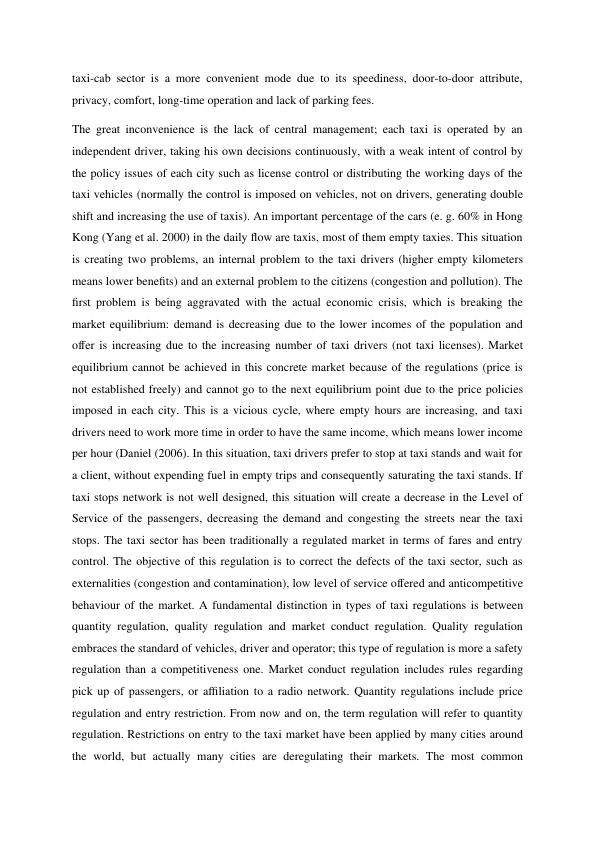
End of preview
Want to access all the pages? Upload your documents or become a member.
Related Documents
Assignment on What does Brexit mean?lg...
|9
|2578
|13
RESEARCH PROJECT TABLE OF CONTENTS Introduction 8 LITERATURE REVIEW6 RESEARCH PROJECT TABLE OF CONTENTSlg...
|24
|6723
|285
Democracy Deficit in European Unionlg...
|14
|3920
|451
International Marketing Strategy (Doc) | Reportlg...
|12
|1831
|68
International Marketing Strategy for the Woolworths Grouplg...
|25
|5688
|80
EU Enlargement and Its Benefits to Firms: History, Waves of Integration, and Recommendationslg...
|8
|2152
|213
